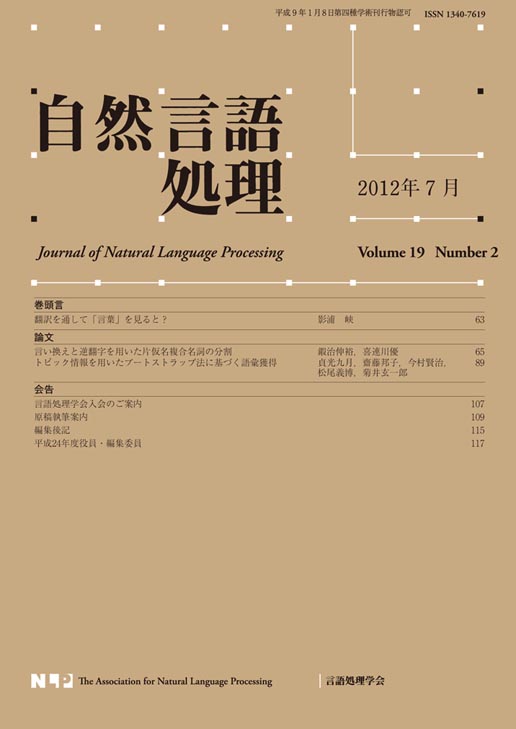All issues

Volume 18 (2011)
- Issue 4 Pages 321-
- Issue 3 Pages 215-
- Issue 2 Pages 69-
- Issue 1 Pages 1-
Volume 18, Issue 1
Displaying 1-3 of 3 articles from this issue
- |<
- <
- 1
- >
- >|
Preface
-
[in Japanese]2011Volume 18Issue 1 Pages 1-2
Published: 2011
Released on J-STAGE: April 27, 2011
JOURNAL FREE ACCESSDownload PDF (133K)
Paper
-
Teiko Nakano, Yoichi Tomiura2011Volume 18Issue 1 Pages 3-29
Published: 2011
Released on J-STAGE: April 27, 2011
JOURNAL FREE ACCESSSome of the inappropriate co-occurrence expressions consisting of a noun n, a case particle c and a verb v (denoted as 〈n,c,v〉) used by learners of the Japanese language are caused by errors of verb selection. This paper proposes a method of providing candidates for appropriate alternative verbs to replace the v in learners’ co-occurrence input 〈n,c,v〉. We assume that a verb of inappropriate co-occurrence (an erroneous verb) tends to have an occurring environment similar to an appropriate verb (a possible correction of the erroneous verb). Based on this hypothesis and using statistical information from a large-scale Japanese corpus, the method produces candidates for appropriate alternative verbs that are estimated to comprise appropriate co-occurrences with the 〈n,c〉 portion of learners’ co-occurrence input in descending order of occurring environment similarity with the original verb. We examine the hypothesis using data of erroneous verbs and their corrections, and further, using the same data, we discuss the usefulness of a composition support system for co-occurring expressions based on the proposed method.View full abstractDownload PDF (638K) -
Toshiyuki Umezawa, Minoru Harada2011Volume 18Issue 1 Pages 31-56
Published: 2011
Released on J-STAGE: April 27, 2011
JOURNAL FREE ACCESSWe propose the method of the discourse structure analysis based on the centering theory and the domain knowledge. We enhanced the centering theory to utilize it for the analysis of dependency relation among sentences. Moreover, object knowledge among objects such as entire-part relation, parent-child relation, object-attribute relation, resemblance are extracted from the co-occurrence dictionary and concept dictionary in EDR electronic dictionary, and are used for the decision of the functional relation between sentences. We defined the discourse structure tree to show the transition of the topic in the discourse. Here, the sentence punctuated by the period makes a node, and each sentence node has only one parent node. Moreover, nine kinds of connection relationships between sentences: DETAIL, EXPLICATE, CONTRAST, CAUSE-RESULT, TRANSITION, CONVERSION, PARALLEL, EXAMPLE and QUESTION-RESPONSE are given to each arc between sentence nodes. Next, we have developed 36 rules to evaluate the possibility of the relation between sentences being each one of the nine kinds of relation types. These rules are applied to each arc, and the relation label which obtained the highest score is given to the arc. The evaluation experiment shows the accuracy of 82% and 81% respectively in deciding the connection destination and the relationship label.View full abstractDownload PDF (1052K)
- |<
- <
- 1
- >
- >|